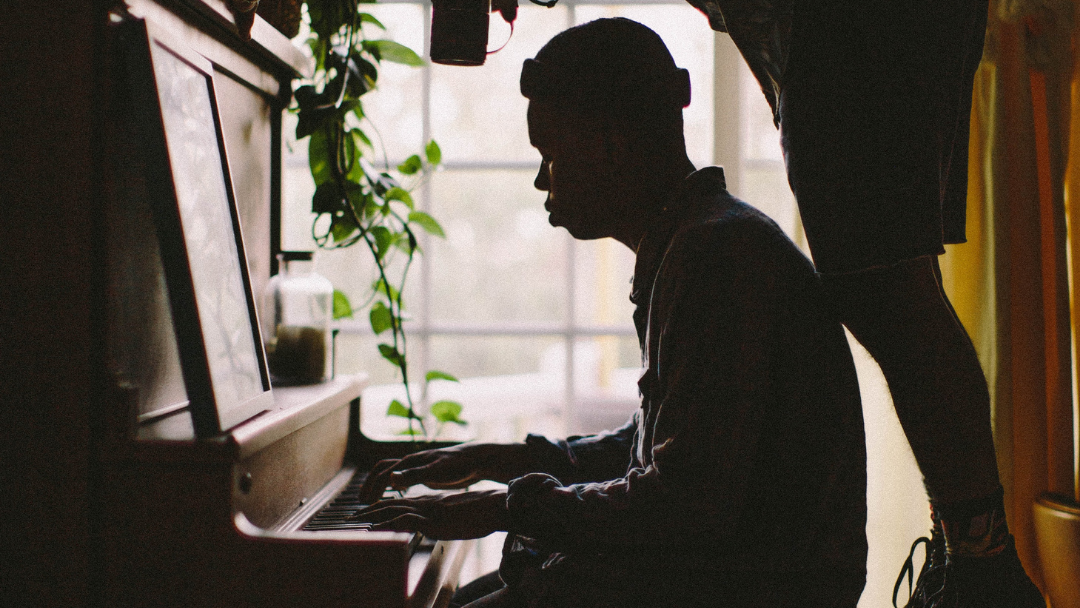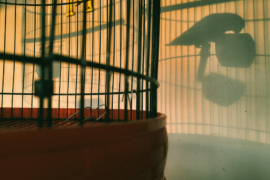THIS WAS BACK WHEN CERTAIN KINDS OF POSTURING WERE STILL REGARDED AS VALID FERTILE GROUND, but she dreams way more frequently than I do, and there’s only so many masks that I can see through where the eye slits are more or less perfectly calibrated to my eyes.
A guest says, “You can plant a seed anywhere in my mind and it will grow.”
Another says, “The darkness of closets is rich in nutrients, but if you stay in there too long you run the risk of exposure.”
It wasn’t until years later that we’d finally gotten to know the house.
I found myself saying, by way of a toast, “Nothing can hide its pain the way a house can hide its pain.” And those are the kinds of equations I have to live with.
Afterwards, a guest came up to me (how many did she invite?) protesting what I’d said, and, in the process, bequeathed to me the Present Tense, which was all burnished and cluttered with shadow in its own right. He said, “You can mix it with anything though and you won’t taste a thing.”
I began wondering if I’d even be able to recognize her amongst this crowd, because it’s never the same process as when we’re alone. It’s never the same process amongst all this store-bought affectation, amongst all these smiles that’re password protected with passwords that’re composed of an infinite amount of characters and thus always being forgotten. In the distance, I hear her telling someone, “I just keep drawing a card until I get one of the major arcana.”
Don’t get me wrong, I’ve had my fair share of endless hallways in life, but there’s still always a chance to make even more room for even more doubt. My shadow of a guest said, “Each home is a replica of the Sphinx, and, so, here’s to your nose!”
We buried our remains in the side garden to help us feel better. The people were invited over mostly to share with us those strings of words that they’d been keeping coiled up in their heads for so long, and still in the original packaging, no less. And so, everyone was allowed to choose their favorite corner and take it back home with them, as a way of marinating the meat for next time. She, though, also wanted a song. I had to tell her my voice was below the frost line. In concession we toasted our last drinks to the Face of Midnight.
She said, “Remember that time when every particle of our hearing was saturated with the fluttering of wings. More than anything I’ve ever heard on the radio, I liked that song best.”
We kept the porchlight on for them as they were leaving, because Midnight is both a straight line and a maze. Afterwards, she wanted to go somewhere where it was still lightning bug season. She said, “Everyone told me they’d adapt, that the light hurt their eyes but that they’d adapt.”
We were in bed when she asked me how often a person should consult the creases on their palms.
“The creases of their palms,” I corrected her, without answering the question.
The next morning we drove through the countryside and were silent as we stared at all the trees. I thought of how nighttime tries its darnedest to mask all perspective. I thought of my mother’s house surrounded by all those gardens, with the wicker furniture decaying in the shade. I thought of the apnea rattle of wind that shook my car whenever I crossed the Chesapeake Bay Bridge on my way to see her, back when we’d first met. And then I woke up to the whistling of the tea kettle. She said, “Give me just one moment.” Sure, I thought, I can grow within that, I can smoke within that. One moment is all I need. I can get high within that. But we barely saw each other afterwards. I left her a note that read, “No amount of science can dispel the mystique of the moon for me.”
One day she finally called and suggested a walk through the garden, the Garden of Imminent Departure. And her hand in mine was more than that. Her eyes and mine were more than that. Together, simultaneously, we kissed the Face of Midnight, and then removed the scaffolding from the pliant cages of our skin. Of course, for a while yet, the guestrooms would remain empty and be in need of bi-weekly dustings.
What is it about the autumnal foliage that I can’t look away? I am transfixed by the oranges and reds as if they’d been intimate companions of mine long ago, and I’m bearing witness to a new life of theirs unfolding in a way that’s much more purposeful than the one before. There are always distances of this sort that need to be looked at more closely, under the most figurative of microscopes.
I found myself once again in the midst of a crowded living room, my living room, saying to the person closest me, “Her eyes are fraternal twins at best.”
That night, everyone except for me knew where the shovels were kept, and how deep the holes had to be. Never did the years peel off so easily, like a Band-Aid gone through the shower.
You and Midnight don’t get along the way you once used to, but there’s no talking to you about it. I’m a father now and my children often mistake me for a mountain peak, even after all the times they’ve seen the top of my head while spying on our parties from the top of the stairs.
Eventually, instead of trying to reason with her, I dug my voice up and left it to dry in the sun. But that wasn’t something she could stand to watch. It was much too gruesome, not to mention the smell. Thankfully, the walk back home felt much shorter than the walk there, and nobody dared ask me to refill the hole that I’d dug.
Like what you’re reading?
Get new stories or poetry sent to your inbox. Drop your email below to start >>>
OR grab a print issue
Stories, poems and essays in a beautifully designed magazine you can hold in your hands.
GO TO ISSUESNEW book release
China Blue by Catherine Gammon. Order the book of which William Lychack Jeffries calls “a fiery declaration of all that is inexpressible about desire and loss and the need to find a home in a world in which even the most solid and real of things feel often less than completely solid or real.”
GET THE BOOK



